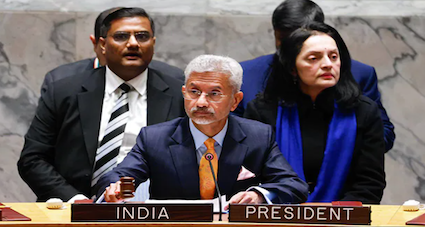India strongly hit back at Pakistan yesterday after it raised the Kashmir issue in the UN Security Council, asserting that a country that hosted slain al-Qaeda leader Osama bin Laden and attacked a neighbouring Parliament does not have the credentials to “sermonize” in the power UN organ.
External Affairs Minister S Jaishankar said the credibility of the UN depends on its effective response to the key challenges of our times, be it pandemics, climate change, conflicts or terrorism.
“We are obviously focused today on the urgency of reforming multilateralism. We will naturally have our particular views, but there is a growing convergence at least that this cannot be delayed any further,” said Jaishankar, who is chairing India’s signature event on reformed multilateralism.
“While we search for the best solutions, what our discourse must never accept is the normalisation of such threats. The question of justifying what the world regards as unacceptable should not even arise. That certainly applies to state sponsorship of cross-border terrorism. Nor can hosting Osama bin Laden and attacking a neighbouring Parliament serve as credentials to sermonize before this Council,” he said.
Eighteen years ago on December 13, terrorists of the Pakistan-based Lashkar-e-Taiba (LeT) and the Jaish-e-Mohammed (JeM) attacked the Parliament complex in New Delhi and opened fire, killing nine people.
Jaishankar’s strong remarks came after Pakistan Foreign Minister Bilawal Bhutto raised the Kashmir issue while speaking in the Council debate on reformed multilateralism.
Jaishankar arrived here Tuesday to preside over two signature events on counter-terrorism and reformed multilateralism being held under India’s current Presidency of the UN Security Council, before the curtains come down this month on the country’s two-year tenure as an elected member of the powerful 15-nation.
India’s Permanent Representative to the UN, Ambassador Ruchira Kamboj, was chairing the debate when Mr Bhutto spoke in the Council.
These are five big quotes of Jaishankar he made in the United Nations:
“While the debate on reforms has meandered aimlessly, the real world meanwhile has changed dramatically. We see that in terms of economic prosperity, technology capabilities, political influence and developmental progress.”
“During the COVID pandemic, many vulnerable nations of the Global South got their first vaccines from beyond their traditional sources. Indeed, the diversification of the global production was itself a recognition of how much the old order had changed.”
“The knock-on effects of conflict situations have also underscored the necessity for a more broad-based global governance. Recent concerns over food, fertiliser and fuel security were not adequately articulated in the highest councils of decision making. Much of the world was therefore led to believe that their interests did not matter. We cannot let that happen again.”
“When it comes to climate action and climate justice, the state of affairs is no better. Instead of addressing the relevant issues in the appropriate forum, we have seen attempts at distraction and diversion. On the challenge of terrorism, even as the world is coming together with a more collective response, multilateral platforms are being misused to justify and protect perpetrators.”
“We not only need to increase stakeholdership but also enhance the effectiveness and credibility of multilateralism in the eyes of the international community and in the eyes of global public opinion. If this is to happen, member states from Latin America, Africa, Asia, and the Small Island Developing States should have credible and continuing representation in the Security Council. Decisions about their future can no longer be taken without their participation.”
Tensions between India and Pakistan have spiked since New Delhi abrogated Article 370 of the Constitution to revoke the special status of Jammu and Kashmir on August 5, 2019. India’s decision evoked strong reactions from Pakistan, which downgraded diplomatic ties and expelled the Indian envoy.
India has categorically told the international community that the scrapping of Article 370 was its internal matter. It also advised Pakistan to accept the reality and stop all anti-India propaganda.
India has told Pakistan that it desires normal neighbourly relations with Islamabad in an environment free of terror, hostility and violence.


